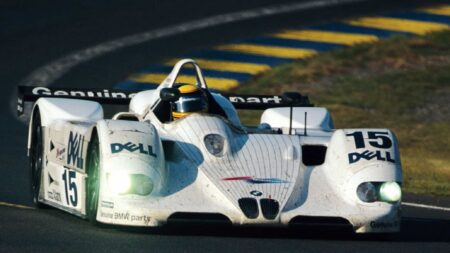
1999: Mercedes flips at Le Mans, leaving BMW to score big
You’ll see many a fierce battle through rose-tinted Ray-Bans, but 1999 was the real deal. Mercedes, Toyota, Nissan and BMW had recent Le Mans experience – and the scale of…

Getty Images
Forty years. Who knows where the time goes? In the midst of one of grand prix racing’s most unpredictable seasons, a friendship pivoted in one controversial afternoon into a deadly rivalry between two of Formula 1’s fastest-ever drivers – and in a matter of weeks ended all too abruptly in a pall of tragedy for both.
Gilles Villeneuve and Didier Pironi couldn’t have been more different as men, yet as fire and ice team-mates at a turbulent Ferrari they still formed a firm bond based on mutual respect and trust, until one betrayed the other in an act of on-track treachery that triggered a devastating spiral. Alain Prost vs Ayrton Senna, Michael Schumacher vs Mika Häkkinen, Lewis Hamilton vs Max Verstappen… all keynote F1 rivalries. But none is more troubling than Villeneuve vs Pironi, the duel that descended so rapidly into a bitterly intense yet all too brief cold war.
Today, F1 people should know better than to add firewood when rivalries smoulder. They should remember Villeneuve vs Pironi, the high stakes in play and what can be lost when it all becomes too personal. The trouble is, with each passing year there are fewer people in the paddock who stretch back that far, who can remember, who truly understand that F1 now, as it most certainly was then, can still be a matter of life or death.
So we’ve turned to Nigel Roebuck and Maurice Hamilton, old friends and distinguished voices, who remember those days all too clearly – because they were there through it all. They knew and dealt regularly with Villeneuve and Pironi, as highly regarded journalists telling the tale from the coalface, Nigel experiencing a level of genuine friendship with Gilles that a latter-day F1 reporter simply can’t imagine forging with the stars of today. Forty years on, Motor Sport invited Nigel and Maurice to the cosy Greets Inn in Warnham, West Sussex to time-warp back to a rivalry that would change F1 forever. It remains an astonishing tale.
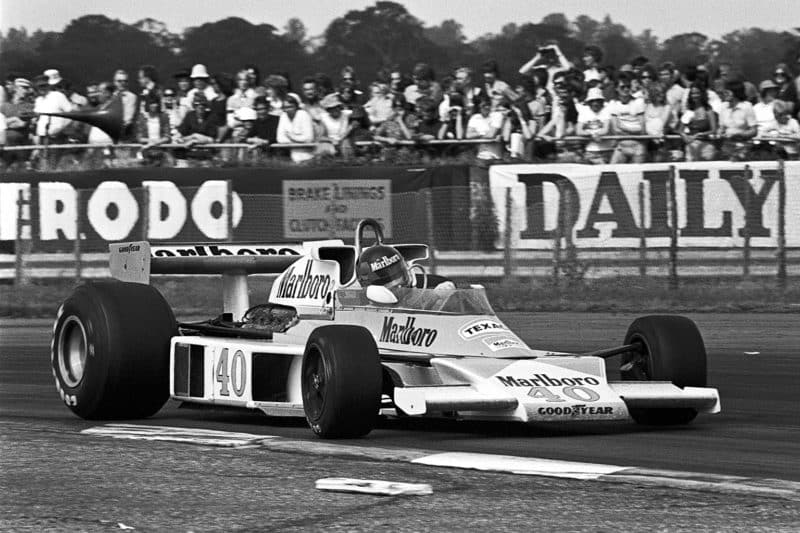
Gilles Villeneuve made his F1 debut at the British Grand Prix in 1977 driving for McLaren. He finished 11th – but should have been placed higher
Getty Images
It was a landmark debut. What are your memories of Gilles at Silverstone ’77?
NR: “I went up to Silverstone on the Wednesday, which was a test day and not for the normal stars, but for the backmarkers and newcomers. And that was the day nobody knows how many times he spun, but didn’t hit anything. It was his first day in an F1 car and the first time he’d seen Silverstone. He had a very short time to find the limit and that was Gilles’ way: to go over it and slightly come back from it. He drove a great race [Villeneuve ran as high as seventh in the early stages] then had a completely unnecessary pitstop because he thought he had an oil pressure problem.”
Maurice Hamilton: “Yes, the gauge in the car was faulty.”
NR: “That’s right. But even so it was a strong debut and made a big impression.”
Maurice, do you remember that day?
MH: “Very well. Like Nigel, I’d read the reports, then noted James’s quotes. That 1977 season was my first as a freelance professional writer and one of my first jobs was to ghost the James Hunt magazine. During the course of that James was talking in the Texaco truck about this guy Villeneuve and kept going on about him. So when we got to Silverstone I thought I’ve got see who this guy is, so I was up there on the Wednesday too. He was spinning like a top! But there was something about him… it was like watching Jochen Rindt, so sideways and not afraid of the car at all. Just powering through Maggotts and Becketts, tail out, finding the limit. It was very exciting.”
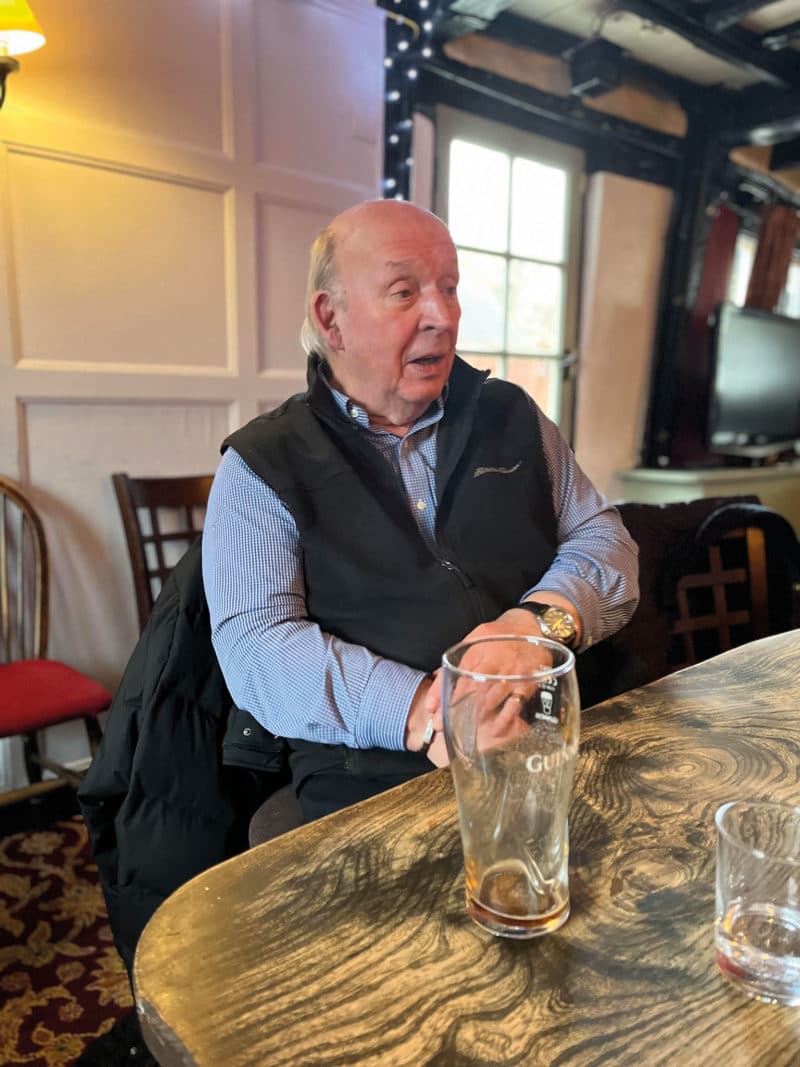
Nigel Roebuck – who was at Silverstone for Gilles’ first F1 drive
Motor Sport
Do you remember first meeting him?
NR: “It was at one of the end-of-season races that year. I didn’t go to Canada, but I did go to Watkins Glen and Gilles was there but wasn’t driving. He made his Ferrari debut at Mosport the following weekend. It was almost certainly Gordon Kirby who introduced us. It was bitterly cold and I just remember this tiny little bloke wearing this huge chequered lumberjack-style jacket, and he was very friendly. We just hit it off. He had time on his hands, so we chatted for about half an hour and it was the start of what was always a really good relationship. He was just so excited to be coming into F1 and with Ferrari.”
MH: “The first time I spoke to him was the Race of Champions at Brands Hatch in 1979 when he won it in a 1978 Ferrari 312T3. I thought, ‘I’ve really got to get an interview with this guy,’ and this was a good place to do it, without the pressure of a grand prix.
“I found him at the back of the pits sitting in a Fiat 128 with his wife Joann. In those days tape recorders were a big lump of a thing. I felt a bit awkward and tapped on the window, which he wound down, and I asked, ‘Do you mind if we do an interview?’ He said, ‘We can do it now, if you like.’ I looked across at Joann, who nodded, so we did our interview with him sitting in the car and me leaning with my tape recorder balancing on the window. I was terribly embarrassed to start with because of the situation, but he wasn’t and neither was Joann. It was brilliant, a lovely interview. The thing that struck me most, because he had a reputation for incidents, was how he shrugged it off: if you race Skidoos you hurt yourself all the time. And it was normal.”
NR: “I’d interviewed him for the first time, ironically, at Zolder the year before, 1978, in his first full year with Ferrari. I came away telling everyone I couldn’t remember an interview like it, with anybody. I kept playing bits back and saying, ‘Just listen to this’: ‘I don’t have any fear of a crash, not at all. I never think I can hurt myself, not seriously.’ He had already broken his leg in a Formula Atlantic crash a few years earlier and just said, ‘After that I had no more fear of hitting barriers because you hit a barrier and you get hurt a bit, then they put you back together again.’ From that point of view he was remarkable. He wasn’t showboating. He didn’t do that. It was just absolutely a bald statement of fact.”
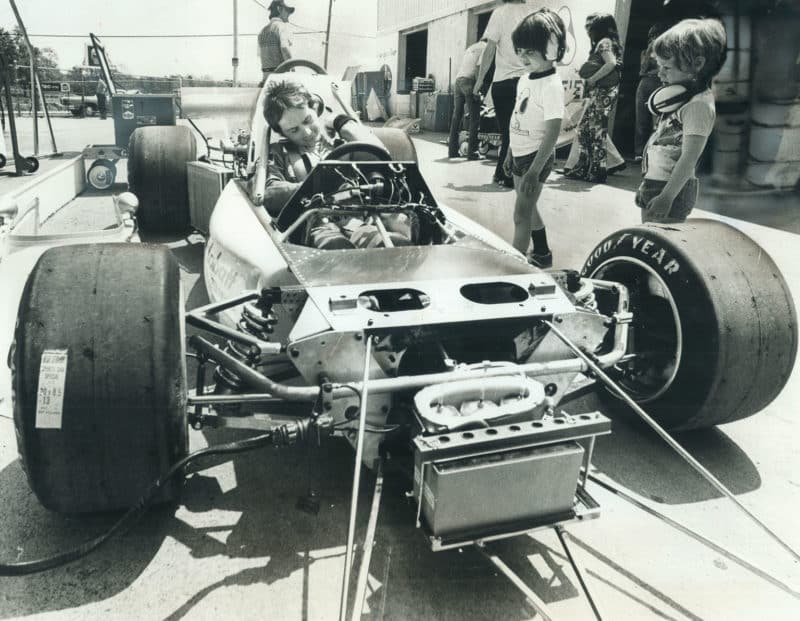
James Hunt raved about Villeneuve, a leading driver in Formula Atlantic – here at Mosport
Getty Images
Around the same time Didier Pironi came through on the back of a stellar junior career. He joined Tyrrell for his F1 debut in 1978. Maurice, you had an early experience with him, didn’t you?
MH: “Yes. I’d first become aware of him at Monaco in 1977 in the Formula 3 race. I remember standing at Casino Square on the exit, which was one of our favourite spots, as they come over the crest towards you. He was mighty through there, just power-sliding his Martini. Beautiful to watch.
“I was working with Eoin Young, who handled the PR account for Elf and First National City Bank, Tyrrell’s sponsors, and we did a lot of work for Ken. Ken’s factory was 10 minutes down the road from Eoin’s office where I went every day. One morning in the last week of November 1977, just after 8am, Eoin said, ‘Get yourself down to Tyrrell’s yard, Ken has been on the phone. There’s a young guy there, you’ll know who it is – although you’re not supposed to.’
“The 008 had been launched the previous week with Patrick Depailler, but there’d been no announcement on the second driver. All the French were saying it was Pironi. Eoin told me to go down and look after this young driver because Ken was going to be late: ‘Take him for breakfast, anything.’ I rushed down there and Pironi was standing in the yard with his hire car, a Ford Escort automatic. I introduced myself, explained Ken was going to be late, so would you like to have some breakfast? I was driving a Beetle, so I let him drive! We went to a local café and he had ham and eggs and lemon tea. I thought I’d take the opportunity to do an interview as we were killing time. He was incredibly nervous, he’d worked his way up and this was going to be his F1 drive as part of the Elf scheme to find a French world champion. He kept looking at his watch all the way through, but gave me a very nice interview. It was clear he was very determined about what he did. Then, when we went to leave, I put my hand in my pocket and he said, ‘No.’ I’ll never forget, he got out his wallet and had these crisp, blue five pound notes, a whole load of them!
“I took him back to the yard. The receptionist wasn’t there, so I took him to Ken’s office and knocked on the door. ‘YES?’ said this deep voice from inside and I ushered him in. I wrote afterwards, it was like a schoolboy going to see the headmaster. Throughout he was incredibly polite, soft spoken, from what I could tell well-educated and a nice young man – but you were very aware of this steel inside him. He was no fool.”
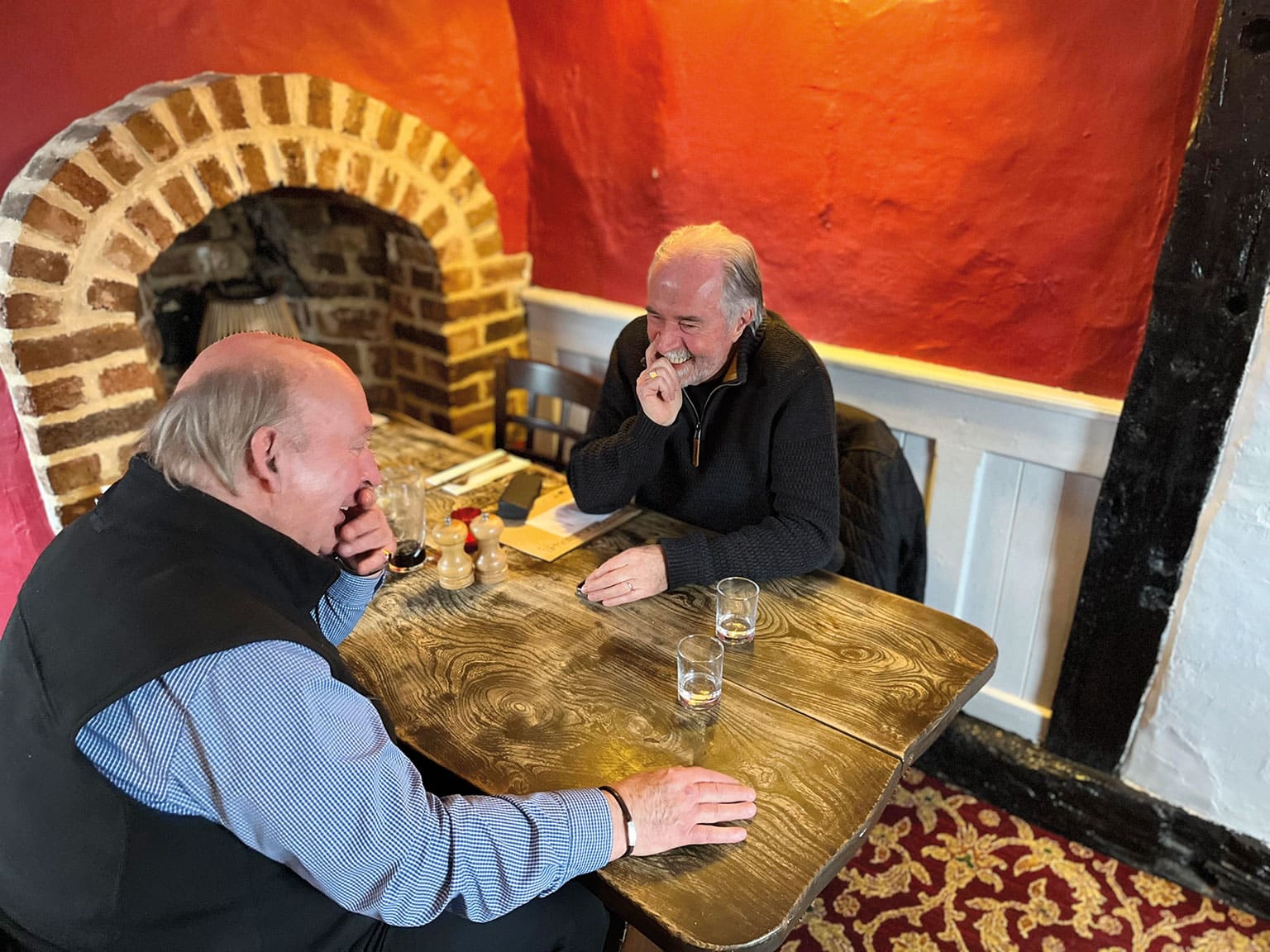
He was part of an amazing generation of French drivers who were generally big characters. But he was different, wasn’t he?
NR: “He said to me a lot of people thought he was arrogant, but he said, ‘I’m not, I am timide – shy. There probably was some truth in that. He was very quietly spoken, but he also had an implacable quality. Something I remember clearly when we had the BMW Procar races at the grands prix, watching Pironi drive that M1 at Monaco around the swimming pool, and that was impressive. But I also remember at Hockenheim in the course of the race he had some kind of coming together with Hans Stuck. In the pits afterwards Stuck was absolutely scarlet in the face, livid, and was bawling at Pironi. Didier never said anything and his expression never changed. He just stood there. Everything about him was kind of low key, although something else comes back to me. Do you remember how he sweated?”
MH: “Oh, profusely.”
NR: “You don’t see it these days. At the end of a race he was pouring sweat, as Hunt did.”
Villeneuve served a high-profile apprenticeship at Ferrari through the late-1970s, mesmerising many with his speed and aggravating others who branded him reckless. Meanwhile, Pironi spent two largely frustrating years at increasingly uncompetitive Tyrrell, then for 1980 switched to Ligier where he outshone Jacques Laffite. Didier scored his first GP victory at Zolder and was unlucky not to win the British GP at Brands Hatch after a brilliant drive through the field. Then Jody Scheckter’s retirement opened the door for Pironi to join Villeneuve at Ferrari for 1981.
NR: “Something about those early days, which I didn’t know at the time and he told me on the phone after Imola 1982 was, ‘From the very start, Joann said to me don’t trust Didier.’ Ten years ago I was in Italy for a celebration of Gilles and Joann was there. I had dinner with her one night and she poured her heart out. I reminded her what she’d said to Gilles about Pironi and she said, ‘I just instinctively felt it. I don’t know why. But that was Gilles’ nature, to trust everybody. That was why [the betrayal at Imola] had such a shattering effect on him.’ Gilles was fundamentally an innocent and he couldn’t cope with the idea of someone he trusted betraying him. But the thing about Pironi was, he was more than good. He was coming to be great.”
MH: “Absolutely. A real natural.”
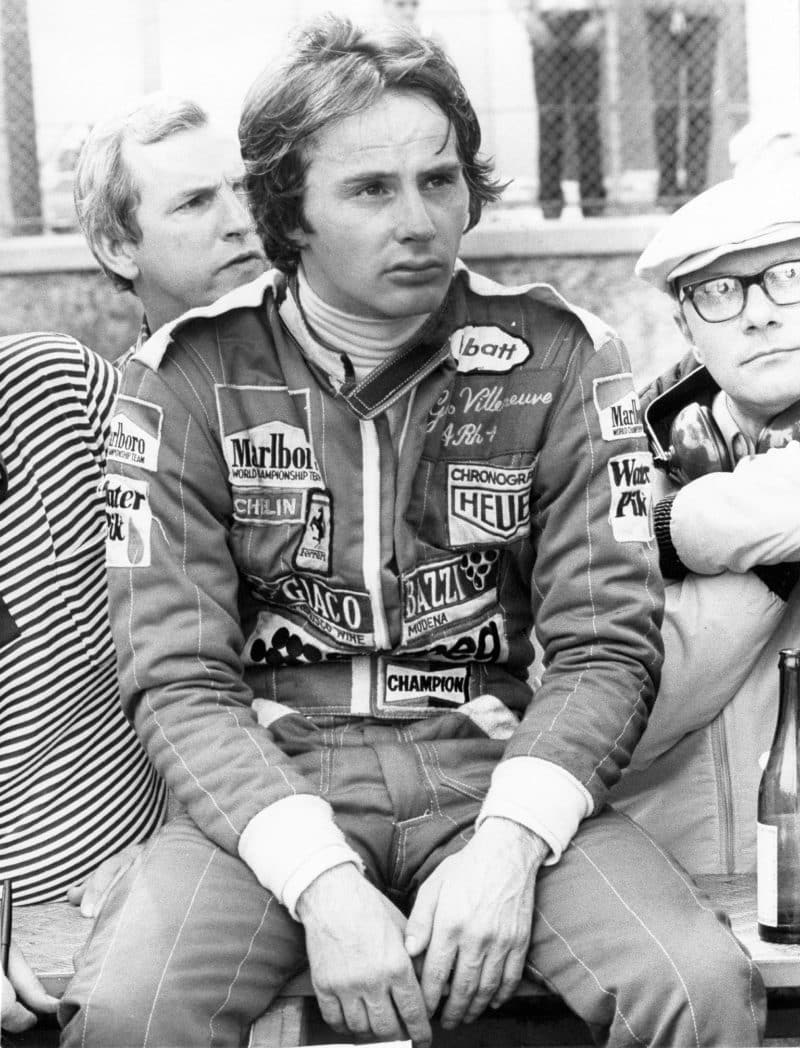
Villeneuve in 1979
Getty Images
Virtuoso victories at Monaco and Jarama with the ungainly 126CK, Ferrari’s first turbo-powered F1 car, while Pironi struggled.
NR: “Harvey Postlethwaite [the British engineer/designer who joined Ferrari mid-1981] said to me that coming to Ferrari must have been a huge mental setback for Didier because he’d had this great year with Ligier in 1980, had dominated several races, but won just once because the car was not that reliable. Harvey said when Didier came to Ferrari he genuinely believed he was the quickest driver on the grid, and it took him a long time to come to terms with the fact he wasn’t.”
MH: “Didier was a master of the high-downforce Ligier, incredibly brave and had tremendous car control. Then he got into the Ferrari, with severe turbo lag, and he couldn’t cope with it, whereas Gilles just kept his foot down and used left-foot braking. According to Harvey, Didier couldn’t handle that Gilles was inordinately quick and the combination with the car troubles was devastating to him.”
So that 1981 season must have really knocked him for six.
MH: “I wouldn’t say knocked for six, because he was very tough, just dealt with it and quietly got on with it. He never said much. But going to Ferrari meant a lot because his parents were of Italian extraction. Now he was going to be world champion, boom.”
NR: “I remember him saying to me, ‘I am a Latin too, you know.’ You’d never have thought so because he was so quiet, but his background definitely was.”
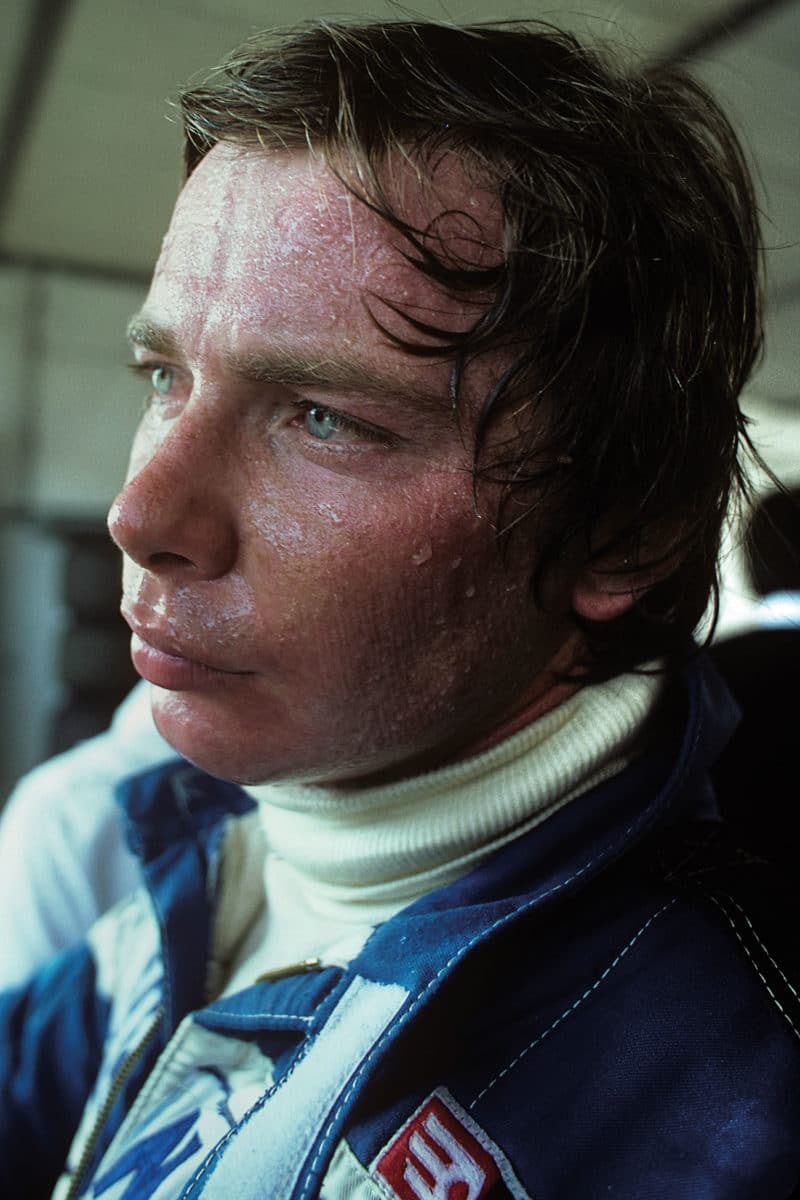
A sweaty Pironi, 1980
Getty Images
What a combination, these two very different characters. But they did become friends, didn’t they?
NR: “Absolutely. And Didier couldn’t say enough about how welcoming Gilles had been, how there were no secrets with Gilles, how he was open and straightforward on anything about Maranello and Ferrari. One thing that has always struck me about the events of 1982: was Didier ever aware of the friendship he threw away that day at Imola?
“At the beginning of that year I was in Rio and did a tape with Gilles about the car on the Friday. Saturday we had qualifying and Gilles again was on the front row and Didier was nowhere [he qualified eighth]. I don’t recall another driver doing this: as we were preparing to leave the track, there was Gilles and he caught my eye to have a quick chat. He said, ‘Look, I just want to have a quiet word about Didier.’ Pironi had had a huge testing accident at Paul Ricard, end over end and finished up in a spectator area. Gilles said, ‘Trust me, it was a big one and it’s shaken him up. He’s a bit off his game this weekend, but he’ll be fine. Please can you say to everybody, don’t be too hard on him this weekend.’ That’s unique in my experience.”
Postlethwaite’s 126C2, but at Imola, the fourth race of the season, everything changed. For better and for worse.
MH: “They weren’t doing well in the championship, and in fact Didier was the only one to score a point. One for sixth in Rio, but only after Nelson Piquet and Keke Rosberg were disqualified from first and second for being underweight. In a tense political climate, that decision triggered a boycott by the FOCA teams of the San Marino GP.”
NR: “They weren’t finishing races. Then we came to Imola where there was the FOCA strike and there were really only four cars in it, two Renaults and two Ferraris. Gilles was a second and a half quicker than Didier in qualifying. In the race the Renaults were a little bit quicker, but once they were out by half distance it was a matter of simply finishing. Ferrari at that time had a fuel consumption problem and as soon as both Renaults were out they were getting pit signals: EZY. As Gilles said, what would have been worse than two Ferraris running out of fuel running 1-2 in Italy?
“Also, and Jody Scheckter confirmed this to me, if the cars were running 1-2 the order at Ferrari at the time was for them to finish in the order in which they became 1-2. Gilles was the guy who had made all the running against the Renaults, and was always ahead of Pironi. But because of the fuel, whenever Gilles was leading he would back off, then Pironi would pass him and the speed would be picked up again, which worried Gilles because he thought, ‘Jesus, we’re not going to finish at this speed.’ It came to the last few laps and he hadn’t minded Pironi passing him because he thought he was playing to the crowds. But then at the last passing place on the last lap, Didier suddenly came past.”
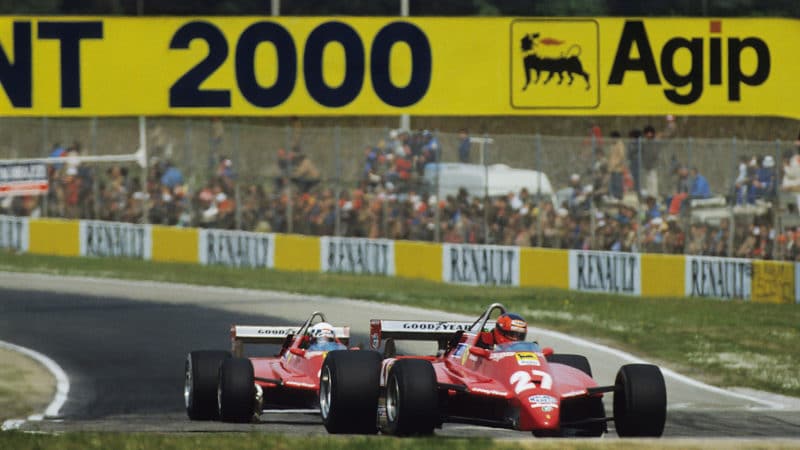
Imola, 1982
DPPI
What are your memories of those final moments at Imola?
MH: “Being staggered when Pironi came by in the lead at the chequered flag. It had appeared to be deal done. They had put on a show and it had been fun, but there was no doubt it was Villeneuve’s race in terms of the weekend. I thought, ‘Hmm, I wonder if that was meant to happen?’ Then in parc ferme they pulled up, Didier was very slow getting out of the cockpit, and Gilles was out of the car, vaulted over the fence and was gone. You thought, ‘Hello, this isn’t good.’ Then the look on his face on the podium told you everything.”
NR: “Remember the way Gilles drove into parc ferme as well? He came screaming in and almost threw it sideways, shut the engine off and then was out.”
MH: “Almost before the car had stopped. And the way Didier was getting out of the car, you could almost see a bubble coming out of his head of him thinking, ‘Oh God, what have I done?’ He wasn’t jubilant.” Then it all emerged with your famous phone call, Nigel.
NR: “Well, Jackie Stewart flew back to Monaco in Gilles’ helicopter that night and he said, ‘In my life I have never seen a racing driver as angry as that. He wasn’t screaming and shouting, but he was incensed.’ No one spoke to Gilles after the race because he was gone.
“So I came back on the Monday morning from Imola and spent that day in the office at Autosport finishing my report. Then on the Tuesday morning I called Gilles. I wouldn’t have been surprised had he not wanted to talk, but in fact we were on the phone for at least an hour. As Jackie said, he wasn’t screaming and shouting. One of the first things I said to him was, ‘Have you spoken to Pironi?’ He said, ‘No, I haven’t and I’m not going to. I’m not going to speak to him again, ever. I’ve declared war. Absolute war.’”
MH: “Chilling.”
NR: “It was. Absolutely chilling.”
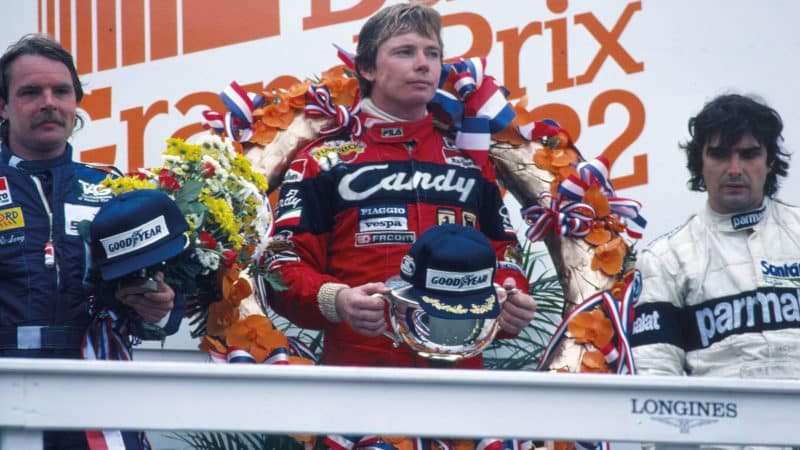
Pironi won the Dutch GP later in the season and was heading for the drivers’ championship, but he often referenced the death of his team-mate
DPPI
Nigel’s landmark interview, Bad Blood at Maranello, was published in Autosport on the week of the next race: the Belgian GP. What do you remember of arriving at Zolder?
MH: “It was pretty tense. Nigel, did you talk to Gilles?”
NR: “I spoke to him in the paddock on the Friday and he was pretty quiet. He was serious, probably more so than usual. On the Saturday morning I went into the Ferrari pit and he saw me. As I walked in, 10 feet to my right Didier walked in from the pitlane as well. As I said, ‘Gilles, can I just…’ He made a signal and we went out the back of the pits because he wasn’t prepared to stay there with Pironi.”
Was that your last conversation with Gilles?
NR: “The last time I exchanged words with him was 10 or 15 minutes before it happened. He was in the car, in the pitlane, and I squatted down by the side. He was completely calm and wasn’t agitated in the slightest. It’s amazing thinking back how much time we spent in the pits, and we were allowed to.”
No TV cameras following everything…
MH: “No, you had to be trackside to keep abreast of what was happening. In fact I don’t think we even had Longines timing monitors in the press room. They were on the pitwall, so you had to be out and about. We wouldn’t have been aware at that moment that Didier had done the fastest lap in qualifying, but Gilles certainly would because he would have been given the strip of paper with the times. There’s no doubt that galvanised him.”
NR: “And those were the days of one-lap qualifying tyres. When I had that long chat with Gilles in Rio he went on about that, how ludicrous and unnecessarily dangerous that was because you’ve got two sets for a qualifying session, good for one lap. Once you were committed to that lap nothing could get in its way. He said they are always on about making the sport safer, and this is one thing we do that is ridiculously dangerous and completely unnecessary. When he had his accident he had made his two runs and was actually going out for one last shot on a mixed set, the two best from each qualifying set. So he almost certainly wasn’t going to go quicker, but Gilles being Gilles, he had to go for it.”
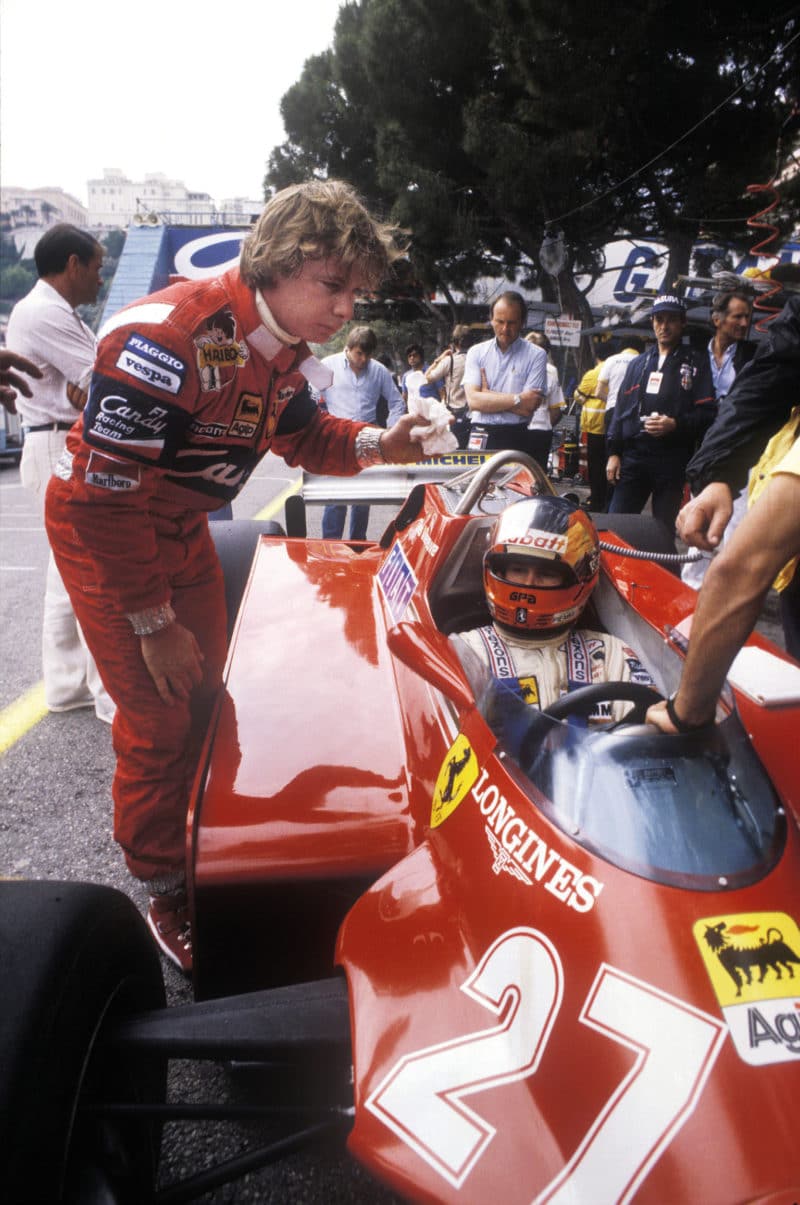
Friends and Ferrari team-mates Pironi, left, and Villeneuve at the 1981 Monaco Grand Prix
DPPI
It was Saturday, May 8. Just a few minutes before the end of qualifying, Villeneuve took a fast left-hander and spotted Jochen Mass’s March trailing into the following right. Gilles pressed on. Mass – a friend – moved right to allow the Ferrari past, but the Ferrari was fully committed to the same line. The accident was sickening. Gilles was thrown from the wreck and into the catch-fencing.
NR: “The Belgian commentator was speaking English and I suddenly remember him saying, ‘An enormous accident to one of the Ferraris.’ I was still in the pits at the time.” News of Villeneuve took time to filter through.
MH: “I was writing for The Guardian, but I was also covering for The Observer Sunday paper in case anything came up. Nigel and I were staying in the same hotel. We didn’t hear until the evening, did we?”
NR: “I think it might have been the proprietor of the hotel who came to our table and told us. Jenks was there. But after the accident I had walked out there with [journalist] Peter Windsor and it was pretty obvious… I can remember as soon as we got there seeing [race track doctor] Sid Watkins’ body language. It was all over. We came back to the paddock and two things stick in my mind: one was a girlfriend of another driver asking, ‘How bad is it?’ I said it looked as bad as it could be. She looked crestfallen and sad, then said, ‘How are we going to get home?’ They’d come to the race with Gilles in his helicopter. The other was another driver, a non-entity, saying to me, ‘Who’s going to get the Ferrari drive?’”
Racing rolled on; it always does. After Zolder, where Pironi’s entry was withdrawn for the race, he was classified second in a topsy-turvy finish to the Monaco GP, was third in Detroit, then arrived in Montreal for what would have been Villeneuve’s home race.
MH: “Didier put it on pole and in those days there wasn’t an official FIA press conference. But being in North America it was expected, so there was a semi-official one put on by the organisers, which Pironi had to attend. I remember seeing him sitting there, and having got to know him reasonably well I could tell he was some place else. He was talking about the pole position, but he wasn’t happy or ecstatic. He was fiddling with the ring on his finger, like you do when you are nervous.
“It was clearly getting to him, because we were three races on from Zolder, the reaction was starting to come out, he was taking the blame for what happened at Imola, therefore he was apparently to blame for Zolder – and here we were in Montreal, Gilles’ home circuit. Also, his marriage was not going well at that time, and he was incredibly uncomfortable. He kept saying, ‘Of course, if Gilles were here he would be on pole.’ This was having a profound effect on him.”
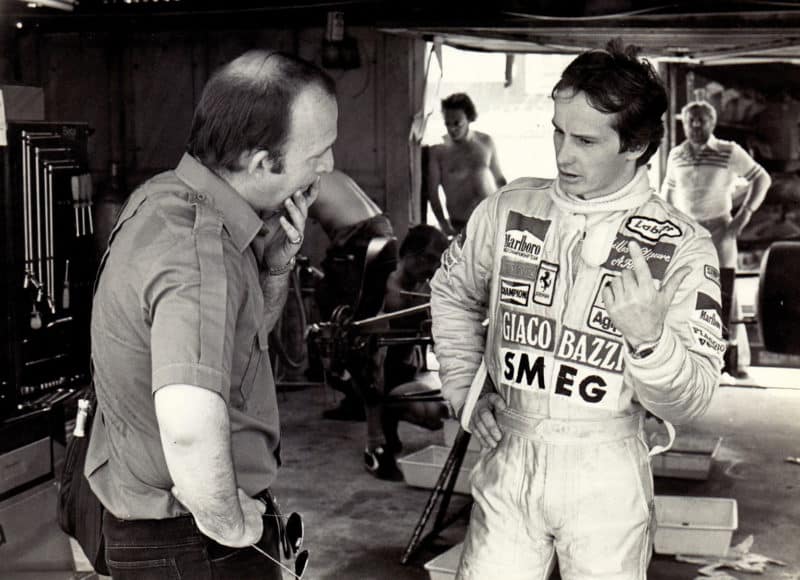
Roebuck, left, interviewed Villeneuve numerous times
DPPI
Then in the race, further tragedy unfolded.
NR: “Pironi stalled at the start, it was too late to abort and Riccardo Paletti was doing 120mph when he hit him in his Osella. That was the second fatality in a month.”
MH: “And of course he gets out of the car and he’s right at the scene of the accident…”
NR: “The other thing I remember about that race was the car had been transformed. Harvey had done a lot of work on the front suspension. Pironi did take the restart, but in the spare car which didn’t have the modified front suspension. The race restarted quite late, it was dark and he was flashing around setting fastest laps. I remember thinking then, if he doesn’t win the championship I will be surprised. He then won easily at Zandvoort.”
MH: “Where again he made reference to Villeneuve: ‘On the slowing down lap I could only think of Gilles.’”
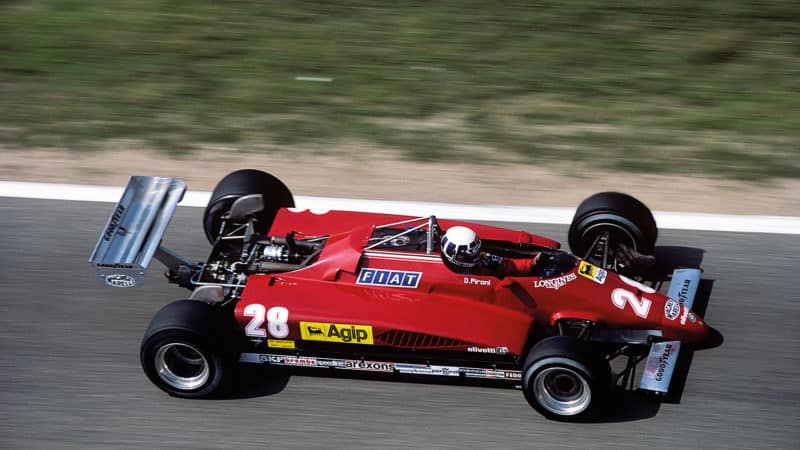
Pironi’s final F1 drive was here at Hockenheim on August 8, 1982 in the boxy Ferrari 126C2
Getty Images
That year Didier Pironi was going to be world champion, wasn’t he?
MH: “No question.”
NR: “There are two accidents I’ve seen, Maurice, that really stick in my mind: one was Barcelona 1975 [when Rolf Stommelen’s Hill cleared a barrier and killed five people] and the other I happened to see was Pironi’s, from quite a way away. We’d arrived late, I can’t remember why and it was pouring down. The session was under way when we got to the track. I was with [journalist] Alan Henry. We parked the car and I went to the boot to get my bag. I looked to my left and I saw this red thing bouncing… I went over to see what was happening. Talk about a scene from hell.”
MH: “I’d been watching that session sitting in the stadium section, in the Sachskurve grandstand. There was only a few people because it was raining – but again we had to be outside! – and I remember distinctly Pironi coming through, sliding his Ferrari just beautifully. This guy was on top of the world. The next thing he didn’t come around. People said he didn’t need to be pushing in the wet, but he did. In those days, believe it or not, Goodyear had three wet-weather compounds to try, so that’s what he was doing.”
NR: “He told me later, ‘I absolutely was not going balls out.’ But that car was very good.”
MH: “He was just enjoying himself.”
NR: “Harvey told me Didier changed a lot after Gilles’ accident. He said, ‘He seriously believed he was going to be world champion. In many ways his life was a mess; his personal life was in pieces. He became extremely arrogant and overconfident. Harvey said when he heard about the accident he wasn’t surprised, that he’d been building up to it, that he was too cocky. Which may or may not be true.”
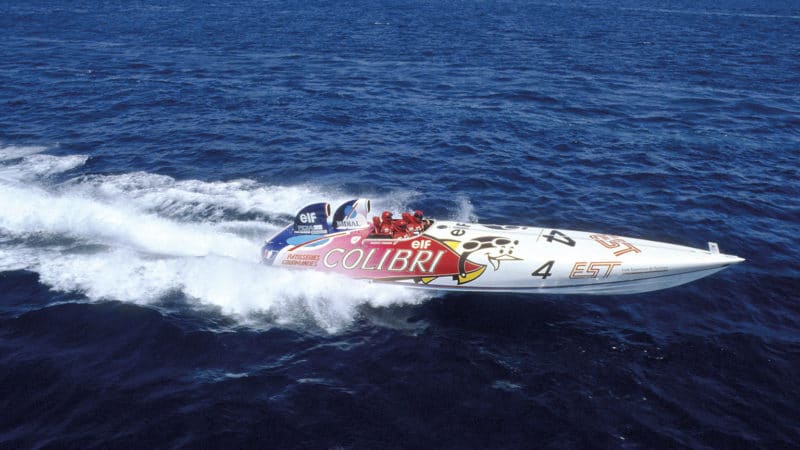
Pironi moved to powerboat racing but was killed, along with his crew, near the Isle of Wight in 1987 in Colibri 4
DPPI
There was talk of a Pironi F1 return, but he never regained the necessary feel and movement in his feet and ankles to make a comeback likely. Instead, he took up powerboat racing – only to lose his life in a crash while racing off the Isle of Wight in 1987.
So you both spoke to him after his accident at Hockenheim in 1982?
MH: “Yes, occasionally. Despite that early good start with him I found him very hard to talk to because he was very shy. He was never rude. He’d say, ‘Hello, how are you?’ But you’d have to draw the conversation out of him.”
NR: “That was what was confusing about him. He was timide, as he said, but at the same time he had this steeliness. “The other thing that was different about the pair of them was Gilles always said the world championship didn’t matter to him, and he meant it. I’ve never heard another driver say that. All that mattered to Gilles was winning races and he said if you win enough the championship comes along anyway. Didier said to me the only thing that mattered to him was becoming world champion, and if he ever felt he couldn’t do it he would stop. Didier was much more in tune with today, when the world championship is all important. It always was important – but not to Gilles in the slightest.”
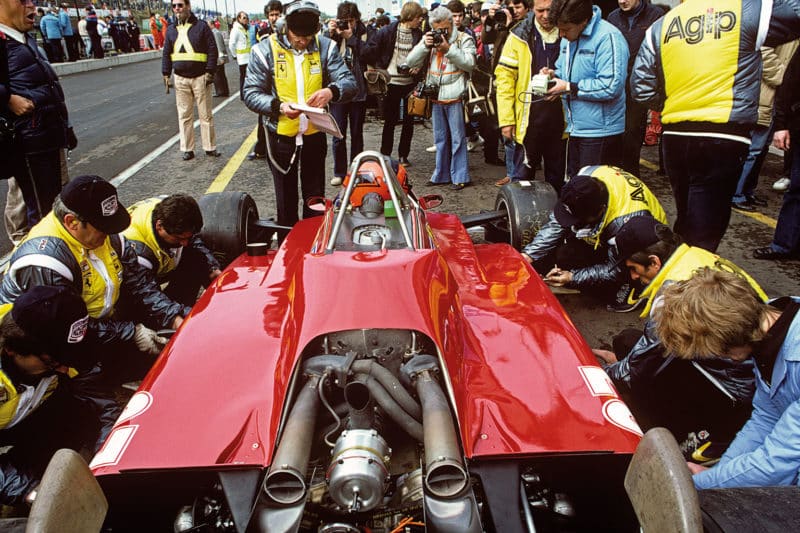
Villeneuve in the pits at Zolder in 1982 before heading out for one final, fateful qualifying lap
Getty Images
What were your feelings when you heard he’d been killed in a powerboat?
MH: “I was at Brands Hatch.”
NR: “So was I, for a Formula 3000 race.”
MH: “It was one of those things you weren’t expecting. So I wasn’t ready for it, but when I heard what happened I wasn’t surprised. He’d been full bore, refusing to back off as they went through the wake of an oil tanker.”
What do these two mean to generations today, and what did they leave behind?
MH: “In grand prix racing over the decades there are partnerships and stories and rivalries all the way through. It’s one of those.”
NR: “For some people who were around then, there’s still a reverence for Gilles. Old boys now… But funnily enough, when Fernando Alonso first went to Ferrari he was struck that after all these years the mechanics still had posters and photographs of Gilles all over Maranello. What was this guy like, he thought, that he was still so important to everybody?”
MH: “In some ways Gilles was a Marmite character, where some thought him mad and crazy because of exploits like three-wheeling at Zandvoort in 1979. But if you studied what he was really doing… I could see why people thought that, but if you enjoyed racing and the Jochen Rindts of his world, he was one of those. He stirred the soul.”
NR: “Something that registered with me was that at the time Gilles died, Niki Lauda was terribly upset. The quote from Niki, which I didn’t hear him say, was ‘he was the best of all of us’.
“Ten years ago I rang Niki to reminisce about Gilles and to my utter amazement two or three minutes in Niki was in tears. Never saw it at any other time. I said, ‘Niki I am so sorry, I didn’t ring to upset you.’ Finally he pulled himself together and just said, ‘I loved that guy. I never met anyone like him.’ I asked him about the quote, that Gilles was the best and he said, ‘Yes, he was. No question.’
“The other quote like that was from Jacques Laffite. Maurice, you remember Watkins Glen 1979, the wet practice on the Friday? He was 11 seconds faster than anyone else, and second was Jody in the other Ferrari. I was in the pits with Jenks watching the session and Jacques was nearby, because he’d been out and thought, ‘Sod this!’ He was like the rest of us, watching in disbelief. He said, ‘No one can do a miracle, but Gilles makes you wonder.’ All these years later, I’ve never met anybody like him.”
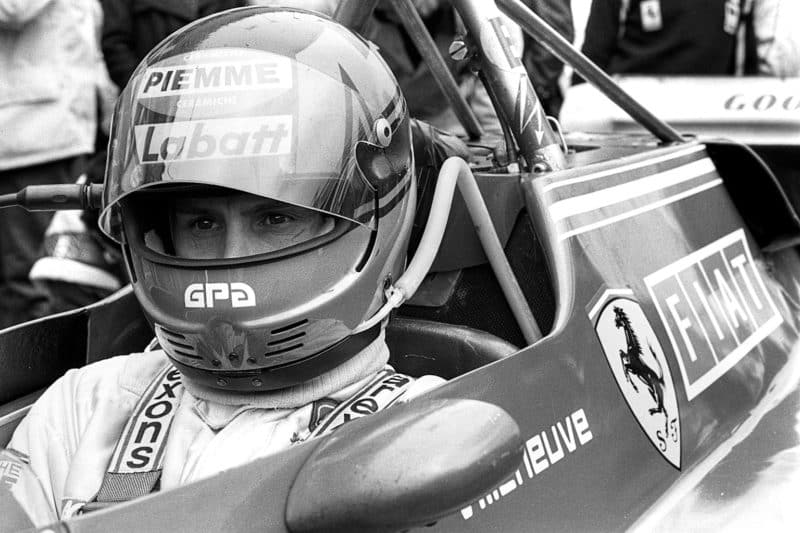
Total concentration – Villeneuve in practice on the same day
Getty Images